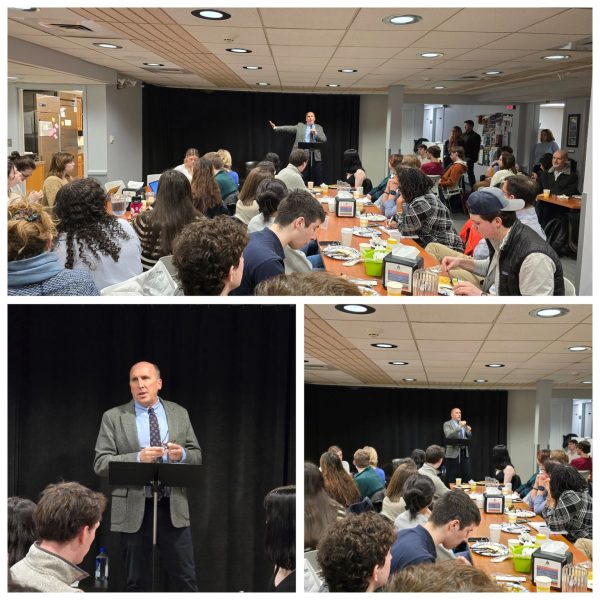Rajinikanth Mohan Discusses Plant Immunity
Thursday, March 23, the Biology Department hosted research specialist and Visiting Assistant Professor (VAP) candidate, Rajinikanth Mohan, for a seminar in Olin Hall 301. Mohan began by introducing himself as former assistant professor of Biology at Hamilton College and postdoctoral associate at Duke University.
The topic of discussion was plant immunity and, specifically, how plant cells activate transcription to kill themselves when stressed. Mohan iterated that cellular suicide in plants is a mechanism of disease resistance.
He delved into two types of immune responses in plants – Effector-triggered immunity (ETI) and systemic acquired resistance (SAR). ETI is an innate response in which the plants’ receptor proteins recognize the foreign bacteria proteins and trigger a fighting response. SAR is like a self-vaccination in which the affected part of the plant sends out a warning to other parts to prepare.
Mohan then posed the question to the audience: what kind of mechanisms would plant cells have to kill themselves?
The audience collectively came up with the two ways plant cells engage in programmed self-destruction – through biological mechanisms such as enzymatic destruction, and through chemical mechanisms such as the production of a toxic cocktail of chemicals that poisons itself.
Mohan went on to talk about the different approaches to studying gene function within plant cells. He used the audience to demonstrate a process for uncovering which cells are involved in cell death. Mohan took a group of students and Dr. Meyers as an example – if Dr. Meyers is essential to the team, then knocking him out would prove whether he has an effect on the team or not. In other words, his absence could speak for his function, or lack thereof, in cell death. Mohan presented another approach in which he hypothesized that increasing the amount of one gene (say, Dr. Meyers) would result in a gain of function in cell death. This approach is called overexpression.
Through his extensive research, Mohan has found two genes that are important in regulating cell death.
Mohan’s use of interactive teaching techniques – constantly posing questions and using the audience as examples – kept the audience engaged and able to follow his complex research on discovering which transcription factors have an effect of inducing plant cell death.
He ended the seminar by stating his enthusiasm for continuing his research here at Colgate and hopes he will be able to teach multiple biology and research courses.
Junior Nina Beatrice commented on her major and what she would like to focus on for research.
“My major is cellular neuroscience. I am interested in doing research about the long-term effects of Adderall on the brain. I think increased research about the drug is necessary because this medication has become increasingly prevalent among high school and college-aged individuals,” Beatrice said.
Beatrice went on to reflect on the lecture.
“I would definitely take a class on plant suicide. I think the topic is interesting and I am curious about plant suicide’s relation to evolution.”





